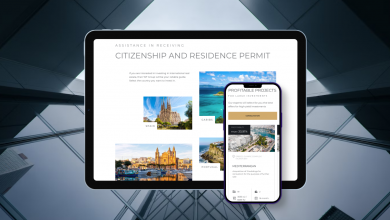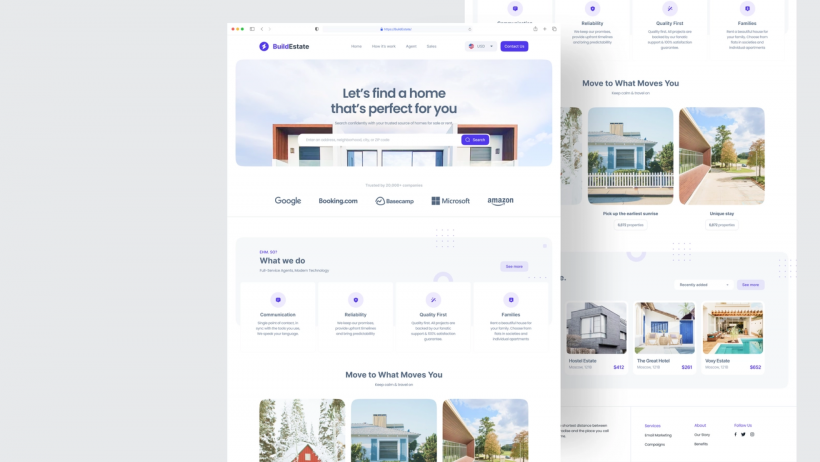When it comes to designing a real estate website, it is important to understand that real estate, like any other industry, is characterized by the unique needs of the target audience, objectives, and tasks. Therefore, in addition to understanding the nuances of web development and mastering advanced technologies and tools, your development team should be well-versed in the peculiarities of the real estate market.
Below we will describe what aspects should be considered in your project to meet the requirements of end users and help you achieve your specific business goals.
Why Does Your Real Estate Business Need a Custom-Built Website?
In the era of no- and low-code development, it would be strange not to think about choosing a simple and fast way to implement a website using a suitable off-the-shelf solution.
Therefore, if your first idea was to choose a website builder for your project, you turned on the wrong track. The fact is that such solutions are good only for one-page websites (for example, promotional websites) and small online stores. For more serious tasks, their capabilities are too limited. Of course, you can always resort to the development of a custom plugin or API to solve your unique problems. However, the constant increase in the functionality of the website in this way generates a lot of vulnerabilities and makes it poorly suitable for updates.
In particular, as for solutions that need rich and sometimes unique functionality, typical for the real estate niche, it makes sense to focus on finding specialists for custom development from the very beginning.
Thanks to this, you can not only implement the desired features (over and above the builder's capabilities) but also achieve the proper level of personalization and usability, which is basically impossible in the case of out-of-the-box solutions.
Finally, custom development will provide your website with a good foundation for further scaling, as the developers will initially design an architecture that is easy to update, optimize, and expand. Thus, you will save yourself from cases where, at a certain stage of your business development, you will have to completely leave your builder-based solution and create a new one that meets the current tasks of your business.
So, in the long run, a custom project increases customer satisfaction and saves you money by not forcing you to re-develop it from scratch.

Your Website as Your Best Way to Interact with Users
Assessing the need for web development for business, you should understand that today having a website is not just another trend in the digital age but a great opportunity to find new ways to interact with potential customers, particularly remotely.
In general, a website and any other digital platforms, such as social networks and media advertising, can, if used correctly, give your business the desired image and attract new customers. Here you can put your company in a favorable light and expand your target audience without being limited to a specific region.
The Main Types of Real Estate Websites
Formally, the real estate industry has four main types of websites. Along with this, you can create an all-in-one web platform that, depending on the role of users, would provide them with different functionality. So, let's find out what these four types are.
- Property listing websites. Such websites unite tenants and landlords in one place. They are usually adapted to devices of any format (desktop, mobile). Note that to launch such a platform, you will most likely need the help of a real estate agency if your business does not provide this type of service.
- Real estate marketplaces. Real estate marketplaces are a kind of digital intermediary between property owners and buyers. Such websites often have some functionality for performing transactions, which can be an excellent monetization source for their owners.
- Real estate aggregators. This type of web resource concentrates ads from third-party real estate websites. This way, it provides end users with an extensive catalog of current offers with the ability to filter and sort them by numerous parameters.
- Property management websites. Homeowners use these types of websites to manage their property's occupancy and track and process utility bills. More intelligent systems can also connect to IoT devices as part of smart home systems and, thus, remotely control their settings.
Core Real Estate Website Features
Regardless of which type of website you are going to create, there is a common set of characteristics that it must have to be competitive, useful, and customer-friendly. We mean the following:
- Clear navigation based on a well-thought-out layout
- Adaptability for any type of device
- Safe in terms of using customer data
- Integrated with social networks
If we are talking about specific real estate website features, the following six ones can help you achieve all this:
Multiple listing services access
The Multiple Listing Service (MLS) simplifies the dealmaking process between real estate brokers by helping listing brokers find cooperative ones that deal directly with buyers. From a practical point of view, MLS is a private database, and if you yourself do not provide any services for renting/selling real estate but need to access it, you will have to make an extra effort. Specifically, you can either find a private realtor's website and contact them directly, search the web for someone who can give you access (usually, it’s a payable option), or contact a real estate agent.
Search with filters
As every day, the real estate market is supplied with tens, hundreds, or even thousands of new listings (it all depends on the size of the region you cover), finding the best option for customers can be a difficult task if they do not have auxiliary tools for this. Specifically, you can narrow their search by using filters built into the search bar. This way, instead of looking at hundreds of ads, your users will be able to only focus on one or two dozen options.
You can also optimize search on your website by integrating interactive maps with property tagging. In particular, For example, Google Maps Integration can help you with this. Thanks to this integration, you can limit the search for your users to the region that suits them best.

Set of images for each real estate asset
Obviously, even the skillful copywriter’s work will not make any ad truly attractive to a potential client if it does not contain detailed and high-quality images. That is why when you build a real estate website, you should enrich it with a section that would include certain requirements for uploaded media.
Video or virtual excursions
Virtual property tours can eliminate the need for your clients to visit specific objects personally. Thus, you can speed up the deals and increase the percentage of their success. Usually, this feature is implemented using 3D technologies.
Messaging
When creating a real estate website, it also makes sense to implement a messaging option within your platform to ensure instant and easy communication between landlords/property owners and tenants/buyers.
Blog
And finally, for effective SEO of your website, it makes sense for you to create a section with articles on relevant topics. This way, you will be able to increase your conversion rate through organic search.
In general, SEO perspectives need to be carefully considered at the design stage of your website – otherwise, it will most likely contain web pages that are either impossible or very difficult to promote in search engines.

Current Trends in Building Real Estate Websites
To make a real estate website that is not only useful to end users but also competitive, viable, and following your business goals, you will need to implement at least one of the real estate market trends. For example, the following technological concepts have every chance of making your website successful.
- Artificial intelligence and machine learning. One of the main problems of real estate websites is the search process. Artificial intelligence (AI) can help solve this problem by analyzing large amounts of data in seconds. AI can also eliminate inefficient processes associated with paperwork and real estate transactions. As for machine learning, it can be used to analyze the preferences of potential buyers and suggest the best real estate options. This will allow each of your clients to quickly and efficiently find the ideal housing options. In addition, "smart" data analysis will help you determine the optimal pricing policy for real estate, which will lead to a fairer cost of housing for all users of your website.
- Internet of Things. The Internet of Things (IoT) can transfer home security tasks into a digital plane through your website. For example, access control, monitoring, and protection systems can be implemented with its help within your web solution. Moreover, IoT can be used to diagnose and prevent emergencies, ensure residents' safety, and monitor buildings' energy efficiency. Finally, it can automatically control heating and air conditioning systems, reducing energy costs and saving resources while maintaining comfortable living conditions.
- Big data. Big data will help you create a personalized experience for your users by providing them with the best balance of pricing and ad terms that meet their individual requirements. Usually, Big data is not a standalone technology and is used in combination with one (or both) of the two above.
- Augmented and virtual reality. With the help of virtual reality technologies, you can integrate 3D property tours into your website, providing a complete immersion for your clients without the need to visit these properties in person. As for augmented reality, it can be great to optimize the experience of your users by providing detailed information and property parameters during their revision.
- Fractional ownership. Fractional ownership is a scheme in which several owners buy shares in one or more properties. At the same time, the care and maintenance of real estate lie on the shoulders of a professional management company. So, if your website represents the services of such a company, you have to implement functionality to automatically calculate the cost of each of the shares.
How to Build a Real Estate Website: 5 Basic Steps
Having a well-thought-out real estate website development plan will keep you from going overboard and help create a competitive and scalable solution. Let's look at the five main steps of this plan.
Website Design Prototyping & Development
The first thing to start developing a real estate website with is prototyping. Of course, at this stage, it is expected that you already have a list of ready-made business requirements and tools that can bring them to life. A prototype is essentially a visualized structure for each web page that your website should include. A detailed prototype gradually turns into a website wireframe, on the basis of which you will have to build a full-fledged design.
As for styling, it should be completely unique and not only distinguish your website from hundreds of others but also reflect the culture and values of your company (brand).

Third-Party Integrations
We have already mentioned the importance of integrating your website with third-party solutions above. Indeed, synchronization with social networks and MLS will be especially useful. Thanks to this, your users will have access to up-to-date data and will be able to log in to the platform securely and in a matter of seconds without having to come up with a new password.
Content Management System Setup
As the amount of information your website operates will gradually grow, you will need to set up a content management system. Thus, you will ensure the attractiveness of your web resource to its target audience and make it easier to upload new information, such as blog articles.
Creating a CRM System
If you provide real estate services, you will need to integrate your website with a CRM system that will ensure the required level of customer experience. In particular, this system will be responsible for automating and simplifying your repetitive business tasks and thereby maximizing customer satisfaction. With its help, you will also be able to optimize the processes of interaction with your customers by providing them with new digital tools for real-time communication (for example, chat with the company, phone calls, etc.).
Testing
Finally, you will have to test your website for bugs and vulnerabilities using manual and automation tools. You should also ensure that your web resource meets generally accepted usability requirements and, in particular, has an optimal level of performance and content loading speed.
WEZOM Experience in Real Estate Platform Development
If you are looking for an outsourcing company for website development for real estate, you are already in the right place. In particular, over the years of its existence, the WEZOM team has implemented more than a dozen solutions for this business niche and continues to improve skills and knowledge through updating and scaling up already launched projects.
We always carefully analyze the business goals of our clients and the market as a whole to create not just competitive solutions but ones that cover the maximum number of the client’s regular workflows. Thus, our clients can move to a new stage of their business development already in the first months after release without expanding the existing staff.

Moreover, by choosing us, you will be sure that your project will be implemented using the latest technologies and tools. This means that it will fully meet the current requirements of the market, no matter how fierce the competition is.
On top of that, we always take care of the security of the solutions we create. For this, along with meeting your unique business requirements, we ensure compliance with generally accepted standards and policies.
Conclusion
Now you know how to create a real estate website and even can build a win-win plan for this. However, when you get to practice, you may realize that this process is much more complicated than you initially thought and requires both an understanding of the real estate niche and excellent skills in web development.
Therefore, you will certainly need a team of specialists who will align your business requirements with their professional experience and be able to implement them in a web format. For example, you can contact us. We always offer our clients the optimal balance between technological advancement and project cost to result in not just a trend-inspired solution but one that will not harm their budget.

